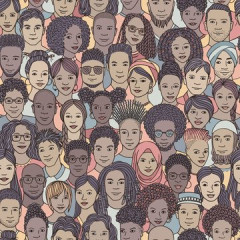Could you first introduce yourself to the reader?
I'm James, the artistic director of Greenwich Theatre and director of Gazing At A Distant Star (also directing Under My Thumb for CultureClash Theatre at this year's Edinburgh Fringe).
How would you describe your show?
Gazing At A Distant Star by Sian Rowland is about people who go missing, and the people they leave behind. Originally presented in support of Missing People (the charity that rocketed into the public eye when the Missing People choir reached the final of Britain's Got Talent this year), the show follows three people as they strive to understand what happened to their loved ones, where they went and why. Rather than a thriller about the search for a missing person, Gazing At A Distant Star is a beautiful, emotional drama about loss and the search for resolution. I chose the script to launch the new Greenwich Theatre Studio where it played a sell-out run in January.
Why do you want to perform at Edinburgh Festival Fringe?
The Edinburgh Fringe remains the biggest arts festival in the world, and Greenwich Theatre has spent the last decade building a profile at the festival. This year we are producing Gazing At A Distant Star, co-producing Under My Thumb (also at Assembly) and supporting a host of emerging theatre companies at both the Pleasance and Underbelly. The festival offers a unique opportunity for shows to be seen by industry, press and audiences alike, and for companies to network and learn from one another. I have brought countless shows back from Edinburgh to play at Greenwich Theatre, and I hope other industry colleagues will see Gazing At A Distant Star and give the production the chance of a future life.
What differentiates it from other festivals?
There are few other festivals which present world class theatre alongside astonishingly ambitious young and emerging theatre companies from early in the morning to early the following morning. I usually spend 2-3 weeks at the festival and see around 120-140 shows in that time. Other festivals see most of the major shows either running for short periods or competing for audiences in the same time slot. Edinburgh remains the most successful shop window for theatre professionals and the most diverse and vibrant arts festival for audiences.
Do you think the Fringe has changed over the years? If so, how? Are these changes positive or negative?
Yes, the Fringe has definitely changed – for me, the biggest change is the point in a show's journey that the Fringe offers. There are now far more shows that arrive at the Fringe having already played elsewhere, generated press reviews and audience comments, and established what does and doesn't work. A decade ago there were far more half-formed shows with very cheap tickets for audiences to try out but now the cost of participating has become so high that producers need to feel confident that their show is going to play well with audiences. Risk taking is on the decline.
What first motivated you to enter the industry? Who were your inspirations?
I have always loved storytelling, in any format, either as a tool to help an understanding of the world around us or to take us away from that world for a while. I had a few pivotal teachers – in particular my A-level English teacher managed to animate literature and drama despite there being little or no practical drama on offer at the school.
If you didn't have your current job, what would you probably be doing?
I would probably be teaching. I'm currently working in a primary school delivering drama workshops and I've taught at university level. I think an understanding of the arts, and an opportunity to participate, can be genuinely life changing.
If you could have any job in the world, what would it be?
There is little that I would change about my current job. I am lucky enough to be able to direct and produce new work, but also our well-equipped mid-scale theatre gives us the ability to offer the kind of support to emerging theatre companies that can make the difference between a company succeeding or folding. The only change that we need is an increase in public subsidy. We are offering a secure beginning to the major theatre companies of the future and we currently operate with subsidy levels accounting for less than 10% of our annual turnover. With more subsidy, we could support more artists and that is the most rewarding part of my job... Or on the other hand, maybe I'd like to run the Edinburgh Fringe…
What is your earliest childhood art memory?
I read a lot when I was very young but I also listened to a lot of audio books. I think the recordings of Michael Hordern reading the Narnia Chronicles have stayed with me – that was probably my earliest experience of classical music through the soundtrack, and of a piece of storytelling that genuinely appealed to adults and children alike – something that remains very important to me.
Do you ever feel any pressure to be a social commentator, or constantly update material to respond to events?
If I feel an obligation to commentate on anything it's the challenges facing artists in a climate of reducing subsidy and the continuing inequality of opportunity for emerging female actors, directors and writers and those from diverse cultural backgrounds. Social commentary in the arts is important, but without support for new artists there will be no arts anyway.
Equally, do you think there has been a shift in public sentiment that has affected your work?
The public's relationship with the arts is constantly evolving but currently I think audiences are starting to rediscover their appetite for new writing and new artistic expression. Site specific theatre and event theatre have done a lot to contribute to that, bringing non-theatregoers to see theatre and increasingly starting a journey that will take them from non-traditional spaces into theatres. It reinforces my commitment to the work and the future.
Describe the last year in 5 words or less?
Politically terrifying but artistically inspiring.
If you could work with anybody, from any point in history, who would you pick and why?
Christopher Marlowe. The English renaissance, when theatre came out from the courts and became a broad appeal public entertainment, must have been an amazing period in the arts in this country. While Shakespeare is heralded as our greatest dramatist, there is something incredibly dynamic about Marlowe's writing that must have astonished audiences. Or with Russell T Davies on the relaunch of Doctor Who – true family entertainment that appeals to all ages is in short supply and is something I've always believed is incredibly important.
Why would a performer opt to do either a ticketed event or participate in the free fringe? What are the benefits and limitations of both?
The Edinburgh Festival Fringe is a unique opportunity to be seen. The Free Fringe is important as it bridges the incidental performance moments on the streets of the festival through to the ticketed venue performances. Audiences are more likely to take a risk on something unusual if it's in the Free Fringe. However, in terms of company development and creating theatre that can continue into the future, it is important that theatre-makers understand everything that sits around the creation of a performance, which means marketing, venue relationships, PR, financial management. It can be prohibitively expensive and a show that doesn't sell can lose a huge amount of money for companies and individuals, but for theatre companies that want a future, participation in the ticketed programme is important.
What advice would you give to someone who wants to take a show up to the fringe?
Budget to play to audiences of 20% but don't let that stop you from going. Raise the money one way or the other, and make a key distinction in your vocabulary. You are not going to lose that money, you are going to invest it in your future as a theatre-maker. Once you get there, meet and talk to as many theatre companies as you can, learn as much as you can from the experience, look after your health but remember no other month in the year is going to live up to your time at the Fringe so enjoy it and soak up as much knowledge and experience as you can.
When and where can people see your show?
- Venue: Assembly George Square (Studio 5), Edinburgh Fringe Festival
- Dates: 3rd – 28th August (Except Monday 14th)
- Time: 12:15
- Buy tickets: https://tickets.edfringe.com/whats-on/gazing-at-a-distant-star
And where can people find, follow and like you online?
- Website: www.greenwichtheatre.org.uk
- Twitter: @greenwichtheatr
- Facebook: @GreenwichTheatreLondon
Gazing at a Distant Star is performing at Assembly George Square at 12:15 on 3rd - 28th (not 14th). For tickets and more information visit the Ed Fringe website.









0 Comments